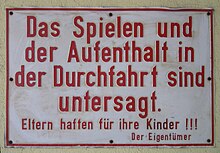Prohibition
A ban is a statement to the omission of an act . This instruction can be defined in more detail in rules , guidelines , orders or legal norms , the latter, for example, as a legal prohibition . Similar terms can - depending on the factual context - represent taboo , ban , interdict or prohibition . Permission and commandment come into question as opposites .
Prohibitions restrict a person's freedom and autonomy in making decisions or acting . In government bids , this is also true for religious or ethical precepts or the conscience not restrict the autonomy, but also can promote.
Etymology and general meaning
Ban , appears in Middle High German as mocked , to ahd. Ferpiotan "forbid", and is linguistically close to Gebot (ahd. Kapot , gipot, etc.), also in the form bot (as in insubordinate ), in the meaning aspect " instruction ", " Jurisdiction ”,“ violence ”.
To distinguish between prohibition and prohibition , Johann August Eberhard wrote in 1837:
“Prohibit. Prohibit. Only what was previously permitted is prohibited ; also forbid that which was never allowed. Therefore something can be forbidden by positive laws that the laws of nature oblige us to refrain from, they not only forbid that, they forbid : because it can never have been allowed. "
This declaration refers to the distinction between “ law ” as norm , principle and natural law , whereby the prohibition encompasses the “not permissible” and the “not possible”. In this sense, one speaks of a “prohibition” in science when a certain procedure must necessarily lead to an incorrect or pointless result because it contradicts observation , definitions or axioms .
In the middle of the 19th century, the universal lexicon of the present and the past defined the prohibition as the opposite of the commandment and pointed out the consequences of this:
“ Prohibition (interdictum, inhibitio), the order to refrain from an action, as opposed to the command as the order to take one. [...], insofar as the V. was also provided with a penalty, the offender can be punished and Damages expire. [...] "
Legal theory
In legal theory, the concept of prohibition plays a central role in the concept of freedom of action :
- In the philosophy of law there is a distinction between positive law and natural law , common sense ( Hume , Scottish School ), on the basis of which bans are based, is widespread in Anglo-American countries ;
- In various legal systems, more or less liberal - libertarian views apply to implicit and explicit prohibitions (“what is prohibited is what is not expressly permitted” or its opposite) and the status of the terms freedom , duty and coercion in relation to prohibition ;
- A distinction is also made between absolute prohibition ( absolute right to be observed by everyone) and relative prohibition ( relative right directed against certain persons or groups; prohibition subject to permission).
The prohibition or prohibition is closely linked to the concept of sovereignty and power , both as exercising power (the right to pronounce prohibitions) and as enforcement power (the power to enforce them) - like every norm, the prohibition norm also requires an institution that has the power but also the duty to guarantee its observance.
Prohibitions to avoid hazards
An obligation for the purposes of security , the prevention of accidents (eg. As active and passive road safety ) and the occupational safety and the health protection is a protective measure to avoid danger . It is to be understood as an “ instruction ” from the person responsible (agent, employer, expert, etc.) and is based on instruction about the hazard and the marking of the prohibition ( prohibition sign , cordoning off prohibited areas and the like).
- A typical example are regulations in road traffic , where various prohibitions (as well as several requirements) serve the safety of road users. The prohibitions are as part of the traffic laws of the state on the road equipment in. Your knowledge represents a large part of the driving test .
The central aspect here - as with bans in many other areas - is the education about the meaning and purpose of the ban as a preventive measure. This area is summarized under the term risk communication .
In contrast to the prohibitions , the commandments (e.g. speed according to the situation) are more intended to increase caution in traffic.
Web links
Individual evidence
- ↑ PROHIBITION, n.. In: Jacob Grimm , Wilhelm Grimm (Hrsg.): German dictionary . tape 25 : V – Verzwunzen - (XII, 1st division). S. Hirzel, Leipzig 1956 ( woerterbuchnetz.de ).
- ↑ GEBOT, n. Subst. verb.. In: Jacob Grimm , Wilhelm Grimm (Hrsg.): German dictionary . tape 4 : Forschel – retainer - (IV, 1st section, part 1). S. Hirzel, Leipzig 1878 ( woerterbuchnetz.de ).
- ^ Johann August Eberhard: Synonymic concise dictionary of the German language. 8th edition Berlin 1837, p. 644, no. 1183; books.google (PDF)
- ↑ Astrid Epp, Rolf Hertel, Gaby-Fleur Böl (a. Hrsg.): Forms and consequences of official risk communication. Federal Institute for Risk Assessment, Berlin 2008, ISBN 3-938163-29-1 (= BfR-Wissenschaft 01/2008, ISSN 1614-3795 )

